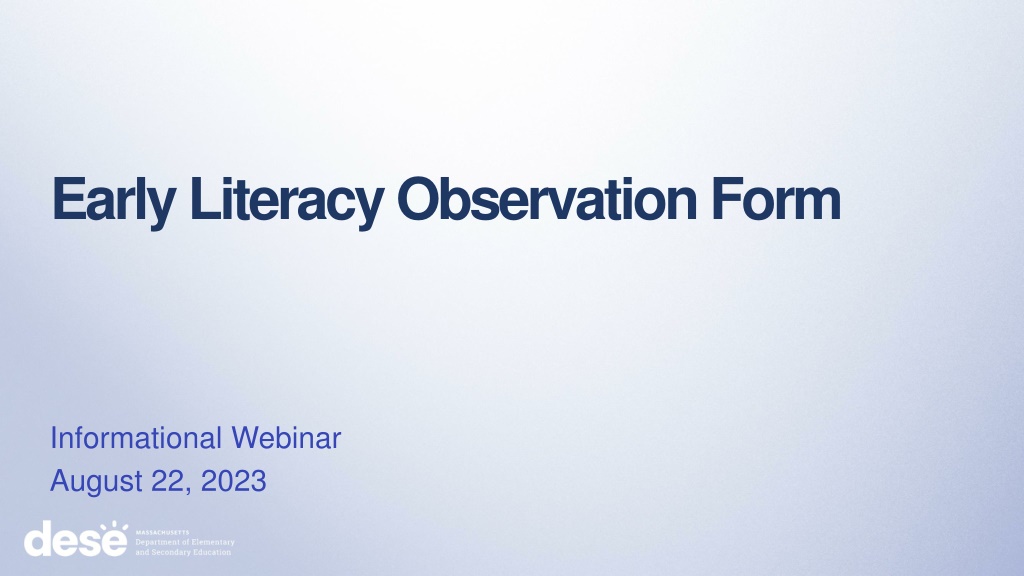

0 likes | 148 Views
This webinar provides information on the development and implementation of the Early Literacy Observation Form in Massachusetts, focusing on preparing educators in evidence-based early literacy instruction. The form aligns with the Mass Literacy Initiative, emphasizing high-quality feedback and support for teacher candidates. The implementation timeline, structure of the observation form, and considerations for online platform users are discussed, aiming for full statewide implementation by 2024-25. Resources and supports for educators are highlighted.

E N D
Early Literacy Observation Form Informational Webinar August 22, 2023 1
Agenda • Background and context • Early Literacy in Educator Preparation • Purpose of the Early Literacy Observation Form • Development and implementation timeline • Early Literacy Observation Form Content and Structure • Implementation in CAP • Resources and supports 2
Ensuring Educators are Prepared in Evidence- Based Early Literacy Instruction By SY2024-2025, all Early Childhood, Elementary, and Moderate Disabilities teacher candidates in Massachusetts will be prepared, through coursework and opportunities for practice and high-quality feedback, in evidence-based early literacy as outlined in the Mass Literacy Guide. Program Expectations & Formative Reviews (2022-2024) Classroom Observation & Feedback Protocol (2023) Foundations of Reading MTEL (2021) Formal Reviews (2024) New Program Approval Requirements for Early Literacy Licensure Programs 4
Focus Areas of Mass Literacy Initiative Mass Literacy Vision Every student in Massachusetts will develop the language comprehension, fluent word reading, and writing skills needed by the end of grade 1, and will continue to increase literacy proficiency through the end of grade 3. Students will have affirming and enriching experiences with literacy. Guidance, Resources, Information High Quality Instructional Materials Professional Learning Funding Educator Preparation 5
Program Expectations & Formative Reviews (2022-2024) Classroom Observation & Feedback Protocol (2023) Foundations of Reading MTEL (2021) Formal Reviews (2024) • Ensuring that teacher candidates have opportunity to demonstrate their knowledge and skills in evidence-based early literacy during field-based placements • Providing candidates with high-quality feedback to support them in being fully ready as early literacy teachers • Supporting SO’s data-driven continuous improvement 6 6
Development & Implementation Timeline New Program Approval Expectations in place 2024-25 Full statewide implementation 2023-24: Partial statewide implementation 2022-23: Observation Form available as a resource 2021-22: Pilot and refinement of the tool 2020-21: Development with Early Lit Ed Prep Network 7
Overview of the Early Literacy Observation Form 8 8
What is the Early Literacy Observation Form? • Comprehensive of a full core literacy block • Evidence-based, culturally and linguistically sustaining practices • Direct links to resources and guidance from Mass Literacy Culturally and Linguistically Sustaining Practices 9 https://www.doe.mass.edu/edprep/resources/early-literacy-observation.html
Teacher and student actions Look Fors • Observable, evidence-based, culturally and linguistically sustaining practices Each component of the core literacy block (oral language developed throughout) • Aligned with CAP elements: • 1.A.1 Subject Matter Knowledge • 1.A.3 Well-Structured Units and Lessons • 2.E.1 High Expectations • Grades PK-3 and 4-6 10
Observation Form Template Mirrors general observation form Synthesize and record evidence for each focus element (based on Look Fors) Provide feedback focused on evidence- based early literacy practices Space for educator reflection (optional) 11
2023-24 Partial Implementation • Goal: Begin implementing across programs in order to identify systems and supports necessary for full implementation in 2024-25. • Use with at least 10 candidates in each relevant program (Early Childhood, Elementary, and Moderate Disabilities) during CAP 13
Implementation in CAP Announced Observation 1 Unannounced Observation 1 Announced Observation 2 Unannounced Observation 2 • • • • 1.A.1 Subject Matter Knowledge 1.A.3 Well-Structured Units and Lessons 2.E.1 High Expectations 1.A.1 Subject Matter Knowledge 1.A.3 Well-Structured Units and Lessons 2.B.1 Safe Learning Environment 1.B.2 Adjustments to Practice 2.A.3 Meeting Diverse Needs 1.B.2 Adjustments to Practice Traditional (CAP Guidelines) • • • • • • • • • 1.A.1 Subject Matter Knowledge 2.A.3 Meeting Diverse Needs 2.E.1 High Expectations 1.A.1 Subject Matter Knowledge 1.A.3 Well-Structured Units and Lessons 2.B.1 Safe Learning Environment 1.A.1 Subject Matter Knowledge 1.A.3 Well-Structured Units and Lessons 2.E.1 High Expectations 1.B.2 Adjustments to Practice Alternative for Early Literacy • • • • • • 14
Considerations for Online Platform users • The Early Literacy Observation Form (in its entirety) is not directly integrated into the CAP Online Platform • The full protocol should be provided to PSs separately to ensure integration of Look Fors into evidence and feedback • However, PSs can complete the observation forms in the Online Platform, with minor adjustments: • Use Look Fors to guide observations/feedback • Different focus elements for announced observations →“required” fields will not align with focus elements. • Will need to enter text in all “required” fields for forms to be “complete” in the system 15
Resources and Supports 16 16
Mass Literacy Online Overview Course • Companion course to the Mass Literacy Guide, which houses an extensive collection of resources for educators that includes links to articles, videos, literacy websites, and much more • 7 modules • Participants who complete the course are eligible for 15 PDPs. 17
Community of Practice for Program Supervisors For Program Supervisors of Early Childhood, Elementary, and Moderate Disabilities programs Goals: • Build understanding of evidence-based early literacy practices aligned to Mass Literacy (by completing the Mass Literacy Online Course and discussing with colleagues) • Strengthen skills in observing and providing high-quality feedback in early literacy • Collaborate with other PS’ across organizations 18
Quick Reference Guide • 2-page overview of Early Literacy Observation Form and its use during CAP • FAQs for Program Supervisors • Access it here: https://www.doe.mass.edu/ed prep/resources/qrg.docx 19
Q&A 20 20
Resources • Early Literacy Observation Form • Quick Reference Guide: Early Literacy Observation Form and CAP • Registration Form for CoP • Early Literacy in Educator Preparation Initiative • Mass Literacy Guide • Mass Literacy Online Course 21
Thank you! Shannon Clancy Educator Effectiveness Coordinator Shannon.Clancy@mass.gov Siobhan Allen Educator Effectiveness Specialist Siobhan.M.Allen@mass.gov https://www.doe.mass.edu/edprep/resources/early-literacy.html 22